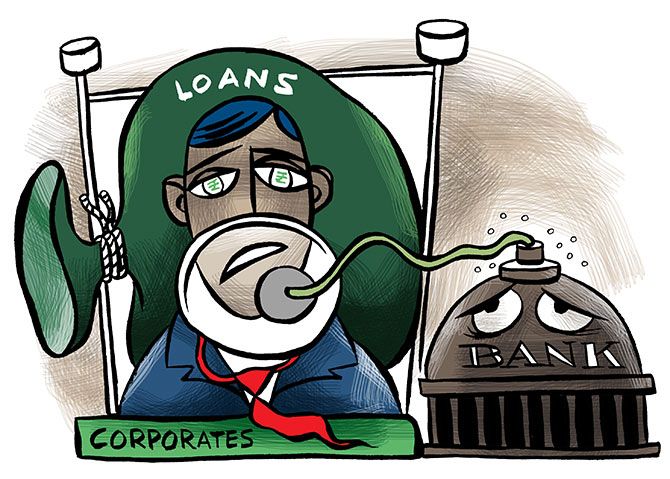For loans under Rs 10 lakh, PSU banks will follow a standard restructuring plan while loans between Rs 10 lakh and Rs 10 crore will follow a graded approach.

Public sector banks, including the country’s largest lender State Bank of India (SBI), have come out with a templated approach for restructuring retail and small business loans of up to Rs 25 crore under the Reserve Bank of India’s (RBI) Covid restructuring package 2.0.
They have also come out with standardised products to make funds available to business entities for improving healthcare infrastructure and to individuals for meeting Covid treatment expenses.
Business loans have been divided into three categories.
For loans under Rs 10 lakh, PSU banks will follow a standard restructuring plan while loans between Rs 10 lakh and Rs 10 crore will follow a graded approach.
For loans above Rs 10 crore, the lenders will put in place a common outreach programme and follow a graded restructuring approach.
There will be standard application and assessment formats and simplified documentation process.
As far as individuals are concerned, customers can access the banks’ portal or manually submit their application in the banks’ branches, post which the application will be processed and the resolution plan will be invoked within 30 days of the application.
And, post invocation, the plan will be implemented within 90 days.
As far as small ticket business loans are concerned, data of eligible units have been extracted by banks and bulk SMSs have sent to these customers, including already restructured accounts.
Offer cum acceptance letters along with applications have been generated centrally by banks.
SBI chairman Dinesh Kumar Khara, addressing a press conference along with Indian Banks Association (IBA) chairman Rajkiran Rai G, said, “Various steps have been taken to ensure that the implementation of resolution framework 2.0 announced by the RBI should be in place by all the public sector banks.
"We have all come out with a templated approach for restructuring loans given to individual borrowers, small businesses, MSMEs.”
“The idea behind this is, those who are involved in the implementation process should not face any hardship”, he said.
“We have tried to use as many channels as possible to reach out to the customers so that we are in a position to mitigate the hardships of the customers,” he added.
According to Rajkiran Rai G, customers of public sector banks do not differentiate between banks, especially small borrowers.
Having different schemes for restructuring confuses people so we thought a templated approach for small borrowers will be easy.
“It is too early to say how many will take up the restructuring scheme,” Rai said.
“Last time we saw that the number of customers who opted for restructuring was not that high,” he said.
Under the first restructuring announced by the RBI last year, around 8.5 lakh small and medium enterprises were eligible but only 60,000 of them availed of the facility.
With regards to the moratorium, Sunil Mehta, IBA CEO, said, “Right now restructuring will take care of the requirement of 80 per cent of the borrowers.
"And, depending on the severity of the second wave, RBI may come out with additional measures.”
The RBI on May 5 came out with the second restructuring package, wherein they said borrowers i.e. individuals and small businesses and MSMEs having aggregate exposure of upto Rs 25 crore and who have not availed restructuring under any of the earlier restructuring frameworks (including under the Resolution Framework 1.0 dated August 6, 2020), and who were classified as ‘Standard’ as on March 31, 2021 will be eligible to be considered under Resolution Framework 2.0.
Apart from streamlining the restructuring process, the public sector banks have come out with three products, under which fresh lending will be provided to vaccine manufacturers, hospitals, pathology labs, manufacturers and suppliers of oxygen, ventilators, and other stakeholders.
Under the emergency credit line guarantee scheme (ECLGS 4.0), hospitals and health care facilities will get loans upto Rs 2 crore to set up oxygen plant along with power back up.
The interest rate on such loans will be 7.5 per cent and the tenor of the loan will be for a maximum of 5 years.
Business loans for healthcare facilities to expand or set up health infrastructure is the second product, where the target group will get funding of Rs 10 - 100 crore, depending on the geography, with a tenor of 10 years.
The interest rate charged by banks for such loans will vary based on the cost of funds of each bank.
Also, banks will provide unsecured covid loans to individuals for covid treatment.
An individual can avail up to Rs 5 lakh for a maximum period of 5 years.
SBI will charge an interest rate of 8.5 per cent for such loans.
Fresh lending under “Covid loans” will get priority sector tag hence banks are offering loans at concessional rates, public sector bankers said.
The RBI in its relief package has also provided a Rs 50,000 crore liquidity window, which will be available with tenors of up to three years at the repo rate to boost provision of immediate liquidity for ramping up Covid related healthcare infrastructure and services in the country.
Khara said the utilisation of the RBI’s liquidity window will depend on the banking sector’s liquidity.
If there is ample liquidity in the banking system, then the utilisation of the RBI’s window will be less.












 © 2025
© 2025